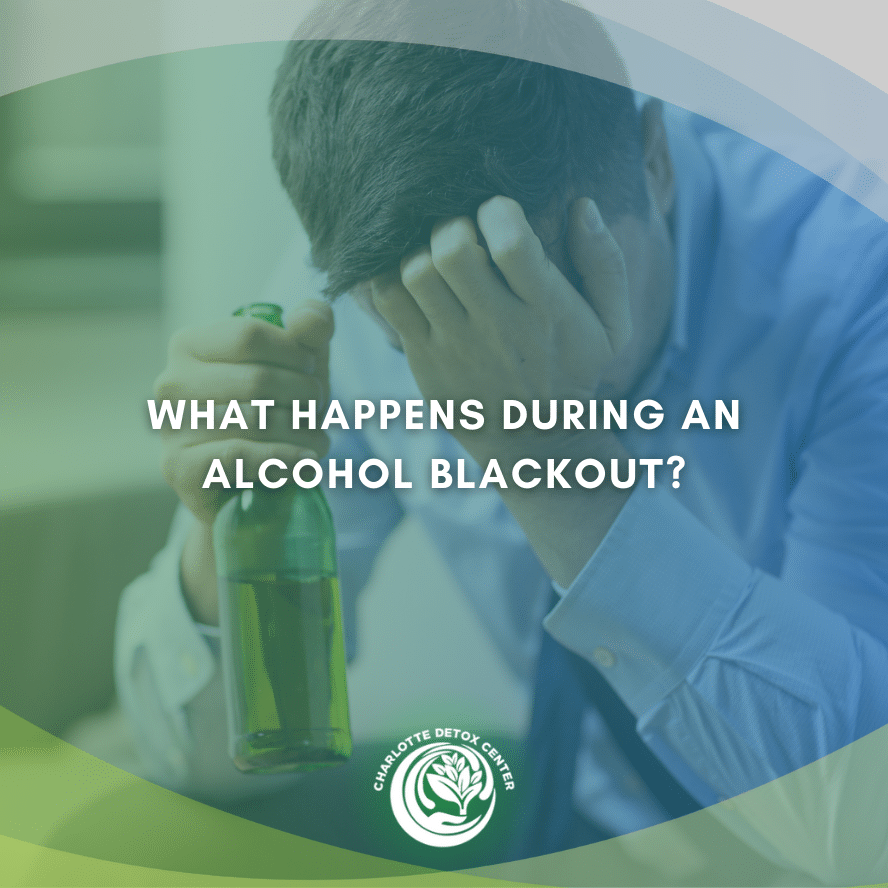What Happens During an Alcohol Blackout?

Medically Verified: 2/1/24
Medical Reviewer
Chief Editor

All of the information on this page has been reviewed and verified by a certified addiction professional.
Too much alcohol can lead to serious, sometimes life-threatening consequences, including blackouts. A blackout is a temporary state of memory loss that may occur if someone drinks a lot of alcohol and has a high blood alcohol level.
During a blackout, people may not be able to make new memories but will remember everything that happened beforehand. At this level of intoxication, people risk being the victim of a crime, doing or saying things they’ll regret, and being injured or killed in an accident.
If you or someone in your life struggles with frequent blackouts or other signs of an alcohol use disorder, reach out to the team at Charlotte Detox Center to learn about starting one of our holistic treatment programs.
What Happens During an Alcohol Blackout?
Research shows that about 50% of people will experience a blackout when their blood alcohol level (BAC) reaches 0.22 percent or more. During a blackout, people may experience symptoms that include:
- Trouble walking
- Slurred speech
- Poor balance
- Vision impairment
- Impaired judgment
After a blackout, people often have no memories from the time when their blood alcohol level was elevated.
What Causes a Blackout While Drinking?
While blackouts are typically associated with heavy alcohol consumption, other medical conditions can cause them. Some of the conditions that can cause a blackout include:
- Fainting
- Low blood sugar
- Taking certain medications
- Oxygen restriction
- Epileptic seizures
- Psychogenic seizures
However, many people use the term “blackout” to describe the loss of memory associated with excessive alcohol consumption.
What Factors Affect Your Blood Alcohol Level?
There is no set number of drinks that will cause a blackout. Certain factors can affect how quickly a person’s blood alcohol level rises and how alcohol affects them.
Some of the factors that can impact your blood alcohol level include:
- Weight
- Gender
- Other intoxicating substances or medications taken
- How quickly you drink
- The type of alcohol consumed
- How much you’ve eaten
Typically, drinking quickly on an empty stomach may elevate your blood alcohol levels faster than drinking slowly on a full stomach. A larger person may be able to drink more than a smaller person before experiencing a blackout. Generally, men can consume more than women before experiencing a blackout because of their body size, composition, and how they metabolize alcohol.
Dangers of Blacking out on Alcohol
People typically need to drink heavily to experience a blackout. Frequent periods of heavy drinking can change the brain’s structure, resulting in long-term memory problems and other cognitive deficits.
- Blackouts are also immediately dangerous. People in a blackout may:
- Be injured or killed in accidents
- Harm other people
- Have risky sex
- Be the victim of an assault or other crime
- Engage in illegal activities
Alcohol slows signals in the brain that control the gag reflexes, making it more likely that people may choke on their own vomit while sleeping or unconscious.
Combining alcohol and other drugs can be risky. For example, using sedatives (including benzodiazepines like Xanax) while drinking increases the risk of blackout because both substances slow central nervous system activity. Similarly, it is dangerous to use products that contain THC while drinking alcohol because the combination of these substances increases the chances of experiencing a blackout.
Preventing a Blackout
Anyone who drinks large amounts of alcohol is at risk for a blackout. Some research suggests that middle-aged men who have developed alcoholism are most likely to blackout while drinking. Young adults may also be at increased risk for heavy drinking, binge drinking, and blackouts.
Here are some steps people can take to minimize their risk of blacking out while drinking alcohol.
- Eat a meal before starting to drink alcohol. Continue to eat regularly while drinking.
- Don’t drink quickly. Sip your drinks slowly. Avoid taking shots and choose drinks with low alcohol by volume.
- Alternate alcoholic drinks with a glass of water.
Following these guidelines will limit the amount you drink overall and decrease the risk of having a high blood alcohol level or blacking out.
Recognize Alcohol Abuse
If you struggle to control your drinking or have frequent blackouts, you may need help to stop drinking and stay sober. Alcohol is an addictive substance, and drinking heavily for prolonged periods can lead to physical dependence.
Recognizing alcohol abuse can be tricky since alcohol use is widely accepted in the United States. Here are some of the signs that you may need treatment for alcohol use disorder:
- You often drink more than you intended to
- You have tried to stop drinking or cut back but couldn’t
- You spend a lot of time drinking or being hungover
- You often think about when you’ll have your next drink
- You have legal, financial, professional, social, or health-related problems associated with your drinking
- You take risks while drinking
- You experience withdrawal symptoms like tremors, sweating, insomnia, anxiety, or nausea when you stop drinking
- You need to drink more to get the desired effects
Experiencing some of these symptoms could mean that you need professional treatment and support to regain control over your drinking and avoid relapse in the future.
Find Help Now
If you or someone you love is struggling with an unhealthy relationship or addiction to alcohol, you are not alone. Reach out to the caring staff at the Charlotte Detox Center to learn about our comprehensive rehab programs. Don’t wait to get the help you need. Start your recovery journey today.
References:
- National Institute on Alcohol Abuse and Alcoholism: Interrupted Memories: Alcohol-Induced Blackouts, Retrieved August 2023 from https://www.niaaa.nih.gov/publications/brochures-and-fact-sheets/interrupted-memories-alcohol-induced-blackouts
- National Library of Medicine: What Happened? Alcohol, Memory Blackouts, and the Brain, Retrieved August 2023 from https://www.ncbi.nlm.nih.gov/pmc/articles/PMC6668891/
